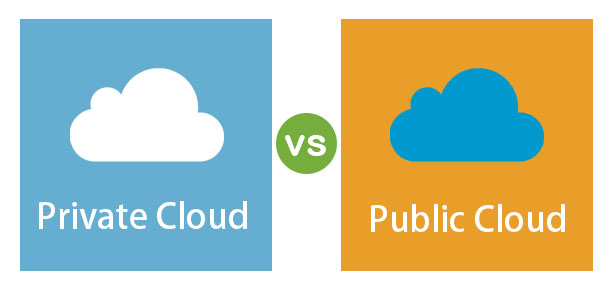Updated June 9, 2023
Difference Between Private Cloud vs Public Cloud
In this article, we will see an outline of Private Cloud vs Public Cloud. Cloud computing has become an integral part of business today. Therefore, a growing organization must learn and understand the structure and facilities available in a cloud computing environment.
Public Cloud and Private Cloud are the two popular categories of this transformative network computing model. Cloud Computing usually is described in 2 categories, i.e., deployment model and service model, public cloud, private cloud, and hybrid clouds are currently available deployment models. An increasing number of companies are incorporating cloud computing results that are overwhelming yet confusing. Private Cloud is a proprietary architecture provided over an intranet dedicated to a single organization’s needs and goals. It is accessible within the firewall by a set of people alone.
Public cloud is computing services offered by third-party providers over the public internet, making them available to anyone who wants to purchase them. It may be free or sold according to the CPU usage cycle, bandwidth, or storage. For example, Amazon elastic compute cloud(EC2), Google Cloud Engine, Amazon AWS, and Microsoft 365. Both Public Cloud and private cloud have their properties infrastructure, ownership, security, location, and data center, customization, cost and upgrade, and management. According to the business needs and specifications, it is up to an individual or organization who needs to choose between the public or private clouds.
Head to Head Comparison between Private Cloud vs Public Cloud (Infographics)
Below are the top 7 comparisons between Private Cloud vs Public Cloud:
Key Differences Between Private Cloud vs Public Cloud
Let us discuss some key differences between Private Cloud vs Public Cloud in the following points:
Private Cloud
A private cloud is an infrastructure used exclusively by a single organization; it can be physically located on its onsite data center or hosted by third-party service providers. However, in a private Cloud, infrastructure and services are maintained on a private network, hardware and software are solely dedicated to your company.
- Private cloud is best suited for the companies that require high data privacy, latency, security and highly regulated that require advanced private and secure data hosting.
- Companies that need high-performance access to file system.
- Those that can support the expenditure associated with the running next-generation cloud data center.
- Hosting business-critical data and applications.
- Organizations that need advanced configurability, adaptability, and flexibility.
Public Cloud
Public cloud is where cloud resources like storage and servers are operated and hosted by third-party service providers and delivered over the internet. For example, as third-party service providers own it, Microsoft Azure needs to share the hardware and network devices with the other companies that have subscribed to the same cloud service providers.
- The public cloud is best suited for Data storage and archival.
- Application hosting and on-demand hosting for microsite and application, latency intolerant, and mission-critical web tiers.
- An auto-scaling environment for large applications.
- Companies need an infrastructure to support a large number of customers.
- Those working on projects encompass many entities like research institutions and NGOs.
Public cloud service providing is a closed club race, with a constant fight between below tech giants.
- Amazon Web Services: It is an undisputed market leader in public cloud servicing; the company offers a complete range of IaaS and PaaS services. Among the best known’s Elastic Compute Cloud, Elastic Beanstalk, Simple storage services, Elastic Block Store, Glacier Services, Relational Database services, etc.
- Microsoft Azure: Microsoft does more cloud service than the amazon after addition of its ‘Intelligent cloud’.In addition to Azure IaaS, PaaS offerings, it also offers SaaS, including office 365 products.
IBM Cloud and Google cloud platforms are other tech giants offering public cloud services.
Comparison Table of Private Cloud vs Public Cloud
The table below summarizes the comparisons between Private Cloud vs Public Cloud:
|
Properties |
Private Cloud |
Public Cloud |
| Infrastructure | Dedicated hardware and network. Data gets stored at a dedicated infrastructure. | Shared hardware and network. Data gets stored at shared infrastructure. |
| Ownership | Owned by a single or set of related organizations. | Owned by multiple organizations that are not related to each other. |
| Security | Highly secure as a higher level of authentication can be implemented by the owner. | It offers standard security that cannot be altered or customized according to the business model. |
| Location of the Data Center
|
Optional, either on-premise or dedicated location on the service provider’s infrastructure. | Location of the data center public cloud infrastructure. |
| Customization | Offers to customize cloud infrastructure according to business-specific needs and requirements. | Only a standard customization facility is offered. |
| Cost | More expensive as setting up a private cloud requires additional hardware and explicit management. | Less expensive as no additional hardware and management are required. |
| Upgrade and Management | Dedicated administrators are required to manage upgrades and installations. | Service providers perform management and roll out updates. |
Conclusion
The current business scenario and the foreseen requirement has to lead to something new nowadays that is a Hybrid cloud. This cloud is a combination of one or more current deployment models like private, public and community models. In this scenario, the organization manages some of the resources on-premises and some on virtual machines. Many business tycoons are opting for this one as it provides advantages of both public and private clouds.
Recommended Articles
This is a guide to the top difference between Private Cloud vs Public Cloud. Here we also discuss the key differences with infographics and comparison table. You may also have a look at the following articles to learn more –




